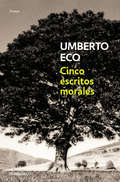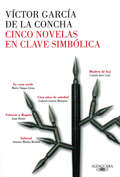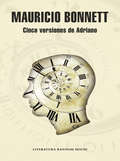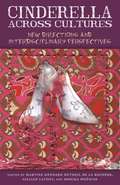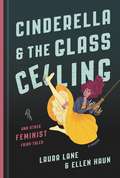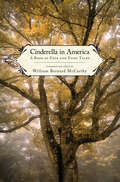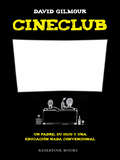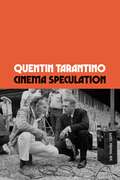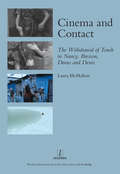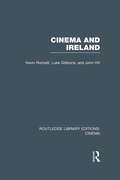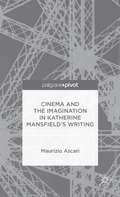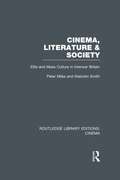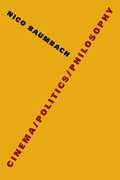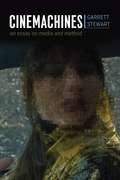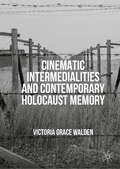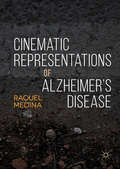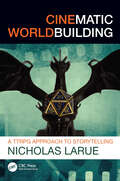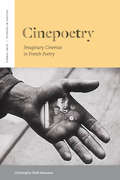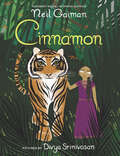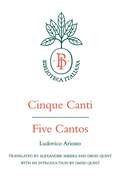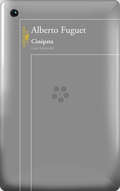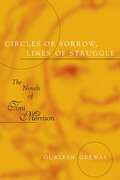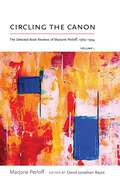- Table View
- List View
Cinco escritos morales
by Umberto EcoUmberto Eco reflexiona sobre la moral y la ética a través de una mirada crítica sobre nuestra historia reciente. Umberto Eco analiza con mirada lúcida y gran brillantez cinco temas de actualidad e importancia extremas: por qué la guerra ha pasado a ser hoy día inviable, las características y vigencia del fascismo, los cambios de la prensa ante la presencia de la televisión, los fundamentos y la posibilidad de una ética laica, así como la tolerancia e intolerancia ante la migración que hará de Europa en los próximos años un continente multirracial. La crítica opina...«Muy convincente y con la clase de destellos de inteligencia y conocimiento que los lectores esperan de una de las mentes más brillantes de Italia.»Library Journal
Cinco novelas en clave simbólica
by Víctor García de la ConchaTodas las claves para disfrutar de la mejor literatura La creación de un espacio subjetivo, que trasciende el plano geográfico para instalarse en el del símbolo, es una de las conquistas de la novela moderna. Víctor García de la Concha explora en este estudio el espacio simbólico en cinco novelas magistrales del siglo XX: La casa verde, de Mario Vargas Llosa; Cien años de soledad, de Gabriel García Márquez; Madera de boj, de Camilo José Cela; Volverás a Región, de Juan Benet, y Sefarad, de Antonio Muñoz Molina. Cinco novelas en las que la palabra de sus creadores conforma lugares construidos a base de metáforas que adquieren su dimensión definitiva en la imaginación del lector, cuando se mueve por ellos y los interpreta. En palabras del autor, «lejos de ser un mero recipiente, el espacio se convierte en un molde activo y fecundo de significado. Sustenta y expresa ideas, sensaciones y sentimientos; dialoga intertextualmente con otros espacios de categoría análoga, y, maridado con el tiempo, se eleva por encima de la cronología particular del relato del que forma parte y proyecta al lector al espacio de los universales: de la anécdota a la categoría».
Cinco versiones de Adriano
by Mauricio BonnettUn día de verano Sebastián, un escritor colombiano, ve a través de laventana de su apartamento londinense a un hombre que le recuerda demanera inquietante a Adriano, un amigo suyo desaparecido en misteriosascircunstancias veinte años atrás. Cuando a los pocos días lo ve denuevo, el interés inicial se convierte en obsesión, y emprende entoncesuna suerte de persecución detectivesca para sacudirse la duda yrecuperar la tranquilidad. Pero la cacería de Sebastián se vuelve, a lapar, retrospectiva, pues busca a Adriano no solo en las calles deLondres sino en su remoto pasado, decidido a entender de una vez portodas, y con la ayuda de dos de sus viejos amigos, quién fue eseenigmático fragmento de su juventud y por qué nunca se supo nada más deél, como si se hubiera evaporado. De esta manera surge el retrato de unser complejo, contradictorio, casi indescifrable, así como un mosaico delos miedos, las dudas, los prejuicios, los remordimientos y losentusiasmos de toda una generación. Escrita con una prosa hipnótica,aguda y llena de hallazgos, e inclasificable por lo que tiene de novelade aprendizaje, de novela de misterio, de novela de aventuras, dereflexión poderosa sobre la soledad, la memoria y el paso del tiempo,Cinco versiones de Adriano confirma a Mauricio Bonnett como uno de losnarradores colombianos más notables de la actualidad.
Cinderella Stories (Great Minds Wit & Wisdom #Grade 1, Module 4)
by Great MindsNIMAC-sourced textbook
Cinderella across Cultures: New Directions and Interdisciplinary Perspectives (Series in Fairy-Tale Studies)
by Martine Hennard Dutheil de la Rochère Gillian Lathey Monika WozniakThe Cinderella story is retold continuously in literature, illustration, music, theatre, ballet, opera, film, and other media, and folklorists have recognized hundreds of distinct forms of Cinderella plots worldwide. The focus of this volume, however, is neither Cinderella as an item of folklore nor its alleged universal meaning. In Cinderella across Cultures, editors Martine Hennard Dutheil de la Rochère, Gillian Lathey, and Monika Wozniak analyze the Cinderella tale as a fascinating, multilayered, and ever-changing story constantly reinvented in different media and traditions. The collection highlights the tale’s reception and adaptation in cultural and national contexts across the globe, including those of Italy, France, Germany, Britain, the Netherlands, Poland, and Russia. Contributors shed new light on classic versions of Cinderella by examining the material contexts that shaped them (such as the development of glass artifacts and print techniques), or by analyzing their reception in popular culture (through cheap print and mass media). The first section, “Contextualizing Cinderella,” investigates the historical and cultural contexts of literary versions of the tale and their diachronic transformations. The second section, “Regendering Cinderella,” tackles innovative and daring literary rewritings of the tale in the twentieth and twenty-first centuries, in particular modern feminist and queer takes on the classic plot. Finally, the third section, “Visualising Cinderella,” concerns symbolic transformations of the tale, especially the interaction between text and image and the renewal of the tale’s iconographic tradition. The volume offers an invaluable contribution to the study of this particular tale and also to fairy-tale studies overall. Readers interested in the visual arts, in translation studies, or in popular culture, as well as a wider audience wishing to discover the tale anew will delight in this collection.
Cinderella and the Glass Ceiling: And Other Feminist Fairy Tales
by Laura Lane Ellen Haunp.p1 {margin: 0.0px 0.0px 0.0px 0.0px; font: 13.3px Times} This wickedly wise (and wisecracking) parody of classic fairy tales redefines happily ever after for the modern feminist era.You know what? It's super creepy to kiss a woman who is unconscious. And you know what else? The way out of poverty isn't by marrying a rich dude -- or by wearing fragile footwear, for that matter. And while we're at it, why is the only woman who lives with seven men expected to do the cooking, cleaning, and laundry?Fairytales need a reboot, and comedy queens Laura Lane and Ellen Haun are the women to do it. In Cinderella and the Glass Ceiling, they offer a rollicking parody of classic (read: patriarchal) tales that turns sweet, submissive princesses into women who are perfectly capable of being the heroes of their own stories. Mulan climbs the ranks in the army but wages a different war when she finds out she's getting paid less than her fellow male captains, Wendy learns never to trust a man-boy stalking her window, Sleeping Beauty's prince gets a lesson in consent, and more.Busting with laugh-out-loud, razor-sharp twists to these outdated tales, Cinderella and the Glass Ceiling is fun, magical, necessary, and totally woke.
Cinderella in America: A Book of Folk and Fairy Tales
by William Bernard MccarthyFor years, many folklorists have denied the possibility of a truly American folk or fairy tale. They have argued that the tales found in the United States are watered-down derivatives of European fare. With this gathering, William Bernard McCarthy compiles evidence strongly to the contrary. Cinderella in America: A Book of Folk and Fairy Tales represents these tales as they have been told in the United States from Revolutionary days until the present. To capture this richness, tales are grouped in chapters that represent regional and ethnic groups, including Iberian, French, German, British, Irish, other European, African American, and Native American. These tales are drawn from published collections, journals, and archives, and from fieldwork by McCarthy and his colleagues. Created along the nationalist model of the Brothers Grimm yet as diverse in its voices and themes as the nation it represents, Cinderella in America shows these tales truly merit the designation American.
Cindy's Cellar
by Colin Thompson Sydnie Meltser KleinhenzCindy finds a special door that leads her to the robot palace.
Cineclub
by David GilmourFue un trato muy poco convencional: Jesse podía dejar de ir al instituto, dormir todo el día, no trabajar, no pagar alquiler pero a cambio tenía que mantenerse alejado de las drogas y ver tres películas a la semana con su padre, el crítico de cine canadiense David Gilmour. Jesse aceptó de inmediato y al día siguiente padre e hijo comenzaron con la primera película de la lista: Los cuatrocientos golpes de François Truffaut. A lo largo de tres años padre e hijo vieron todo tipo de películas, desde las consideradas joyas del cine hasta los grandes bodrios de todos los tiempos. Con el trasfondo de El padrino, Instinto básico, Showgirls, Ciudadano Kane o La ley del silencio, David y Jesse hablan de los principales directores de cine, de las escenas célebres y de los actores que las protagonizaron, y poco a poco sobre todo tipo de temas: chicas, música, mal de amores, trabajo, drogas, talento, dinero, amor, amistad... Cineclub es un repaso personal de la historia del cine, un desafío a nuestras nociones de la educación y, sobre todo, la historia real y conmovedora acerca de cómo un padre y un hijo sortearon una época muy especial en su relación; en la que los hijos se encierran en sí mismos y los padres pierden la oportunidad de llegar a ellos. Esta es la historia de una decisión que lo cambió todo.
Cinema Speculation
by Quentin TarantinoA unique cocktail of personal memoir, cultural criticism and Hollywood history by the one and only Quentin Tarantino.The long-awaited first work of nonfiction from the author of the number one New York Times bestselling Once Upon a Time in Hollywood: a deliriously entertaining, wickedly intelligent cinema book as unique and creative as anything by Quentin Tarantino.In addition to being among the most celebrated of contemporary filmmakers, Quentin Tarantino is possibly the most joyously infectious movie lover alive. For years he has touted in interviews his eventual turn to writing books about films. Now, with CINEMA SPECULATION, the time has come, and the results are everything his passionate fans - and all movie lovers - could have hoped for. Organized around key American films from the 1970s, all of which he first saw as a young moviegoer at the time, this book is as intellectually rigorous and insightful as it is rollicking and entertaining. At once film criticism, film theory, a feat of reporting, and wonderful personal history, it is all written in the singular voice recognizable immediately as QT's and with the rare perspective about cinema possible only from one of the greatest practitioners of the artform ever.
Cinema and Contact: The Withdrawal of Touch in Nancy, Bresson, Duras and Denis
by Laura McMahonDrawing on the work of contemporary French philosopher Jean-Luc Nancy, Cinema and Contact investigates the aesthe-tics and politics of touch in the cinema of three of the most prominent and distinctive filmmakers to have emerged in France during the last fifty years: Robert Bresson, Marguerite Duras and Claire Denis. Countering the domi-nant critical account of touch elaborated by recent models of embodied spectatorship, this book argues that cinema offers a privileged space for understanding touch in terms of spacing and withdrawal rather than immediacy and continuity. Such a deconstructive configuration of touch is shown here to have far-reaching implications, inviting an innovative rethinking of politics, aesthetics and theology via the textures of cinema. The first study to bring the thought of Nancy into sustained dialogue with a series of detailed analyses of films, Cinema and Contact also forges new interpretative perspectives on Bresson, Duras and Denis, tracing a compelling two-way exchange between cinema and philosophy.
Cinema and Ireland: Film, Culture And Politics (Routledge Library Editions: Cinema)
by John Hill Luke Gibbons Kevin RockettThis was the first comprehensive study of film production in Ireland from the silent period to the present day, and of representations of Ireland and ‘Irishness’ in native, British, and American films. It remains an authority on the topic. The book focuses on Irish history and politics to examine the context and significance of such films as Irish Destiny, The Quiet Man, Ryan’s Daughter, Man of Aran, Cal, The Courier, and The Dead.
Cinema and the Imagination in Katherine Mansfield’s Writing
by Teresa A. FisherUsing silent cinema as a critical lens enables us to reassess Katherine Mansfield's entire literary career. Starting from the awareness that innovation in literature is often the outcome of hybridisation, this book discusses not only a single case study, but also the intermedia exchanges in which literary modernism at large is rooted.
Cinema, Literature & Society: Elite and Mass Culture in Interwar Britain (Routledge Library Editions: Cinema)
by Malcolm Smith Peter MilesDuring the interwar period cinema and literature seemed to be at odds with each other, part of the continuing struggle between mass and elite culture which so worried writers such as Aldous Huxley, T.S. Eliot and the Leavises. And this cultural divide appeared to be sharp evidence of a deeper struggle for control of the nation’s consciousness, not only between dominant and oppositional elements within Britain, but between British and American vales as well. On the one hand, films like Sing As We Go, Proud Valley, and The Stars Look Down consolidated the assumptions about the existence of a national rather than separate class identities. On the other hand, working-class literature such as Love on the Dole articulated working-class experience in a manner intended to bridge the gap between the ‘Two Englands’. This book, originally published in 1987, examines how two of the most significant cultural forms in Britain contributed indirectly to the stability of Britain in the interwar crisis, helping to construct a new class alliance. A major element in the investigation is an analysis of the mechanics of the development of a national cultural identity, alongside separate working-class culture, the development of the lower-middle class and the implications of the intrusion of Hollywood culture. The treatment throughout is thematic rather than text-oriented – works of Graham Greene, George Orwell, Bert Coombes, Evelyn Waugh, the British Documentary Film Movement and Michael Balcon are included in the wide range of material covered.
Cinema/Politics/Philosophy (Film and Culture Series)
by Nico BaumbachAlmost fifty years ago, Jean-Louis Comolli and Jean Narboni published the manifesto “Cinema/Ideology/Criticism,” helping to set the agenda for a generation of film theory that used cinema as a means of critiquing capitalist ideology. In recent decades, film studies has moved away from politicized theory, abandoning the productive ways in which theory understands the relationship between cinema, politics, and art. In Cinema/Politics/Philosophy, Nico Baumbach revisits the much-maligned tradition of seventies film theory to reconsider: What does it mean to call cinema political?In this concise and provocative book, Baumbach argues that we need a new philosophical approach that sees cinema as both a mode of thought and a form of politics. Through close readings of the writings on cinema by the contemporary continental philosophers Jacques Rancière, Alain Badiou, and Giorgio Agamben, he asks us to rethink both the legacy of ideology critique and Deleuzian film-philosophy. He explores how cinema can condition philosophy through its own means, challenging received ideas about what is seeable, sayable, and doable. Cinema/Politics/Philosophy offers fundamental new ways to think about cinema as thought, art, and politics.
Cinemachines: An Essay on Media and Method
by Garrett StewartThe hero stands on stage in high-definition 3-D while doubled on a crude pixel screen in Billy Lynn’s Long Halftime Walk. Alien ships leave Earth by dissolving at the conclusion of Arrival. An illusory death spiral in Vertigo transitions abruptly to a studio set, jolting the spectator. These are a few of the startling visual moments that Garrett Stewart examines in Cinemachines, a compelling, powerful, and witty book about the cultural and mechanical apparatuses that underlie modern cinema. Engaging in fresh ways with revelatory special effects in the history of cinematic storytelling—from Buster Keaton’s breaching of the film screen in Sherlock Jr. to the pixel disintegration of a remotely projected hologram in Blade Runner 2049—Stewart’s book puts unprecedented emphasis on technique in moving image narrative. Complicating and revising the discourse on historical screen processes, Cinemachines will be crucial reading for anyone interested in the evolution of the movies from a celluloid to a digital medium.
Cinematic Intermedialities and Contemporary Holocaust Memory
by Victoria Grace WaldenThis book explores the growing trend of intermediality in cinematic representations of the Holocaust. It turns to the in-betweens that characterise the cinematic experience to discover how the different elements involved in film and its viewing collaborate to produce Holocaust memory. Cinematic Intermedialities is a work of film-philosophy that places a number of different forms of screen media, such as films that reassemble archive footage, animations, apps and museum installations, in dialogue with the writing of Deleuze and Guattari, art critic-cum-philosopher Georges Didi-Huberman and film phenomenologies. The result is a careful and unique examination of how Holocaust memory can emerge from the relationship between different media, objects and bodies during the film experience. This work challenges the existing concentration on representation in writing about Holocaust films, turning instead to the materials of screen works and the spectatorial experience to highlight the powerful contribution of the cinematic to Holocaust memory.
Cinematic Representations of Alzheimer’s Disease
by Raquel MedinaThis book offers a cross-cultural approach to cinematic representations of Alzheimer’s disease in non-mainstream cinema. Even though Alzheimer’s disease, the most common form of dementia, is a global health issue, it is not perceived or represented homogenously around the world. Contrary to very well-known mainstream films, the films discussed do not focus on the negative aspects normally associated with Alzheimer’s disease, but on the importance of portraying the perspective of the persons living with Alzheimer’s and their personhood. Similarly, this book analyses how the films use Alzheimer’s as a trope to address issues relating to different areas of life and society such as, for example, family matters, intergenerational relationships, gender issues, national traditions versus global modernity, and caring for people with dementia. By examining an array of films, from crime fiction to documentary, that each present non-stigmatising representations of Alzheimer’s disease, this in-depth study ultimately demonstrates the power of culture in shaping meaning.
Cinematic Worldbuilding: A TTRPG Approach to Storytelling
by Nicholas LaRueEverybody has a story in them. Some people lack the language and the tools to tell that story effectively. As an avid tabletop role-playing game player, I’m amazed at people’s ability to tell stories on the spot. Both the players and the game masters are creating worlds in their minds and playing out the events, using improv, in real-time. Being an author and screenwriter, I know how difficult it is to create consistent and well-constructed characters, themes, and conflicts. I believe that storytellers looking to level up in the classroom, their hobby, or career could learn a lot from games like Dungeons & Dragons, Pathfinder, and others. This book seeks to give people the tools and language to create and master their worlds and characters, using TTRPG mechanics and rulesets as foundational elements. This book will contain insights and interviews from some of today’s most respected game masters, players, actual play actors, and we’ll also hear from some of the people behind the scenes responsible for creating these games, and how they view worldbuilding and storytelling for their audiences.
Cinepoetry: Imaginary Cinemas in French Poetry (Verbal Arts: Studies in Poetics)
by Christophe Wall-RomanaCinepoetry analyzes how French poets have remapped poetry through the lens of cinema for more than a century. In showing how poets have drawn on mass culture, technology, and material images to incorporate the idea, technique, and experience of cinema into writing, Wall-Romana documents the long history of cross-media concepts and practices often thought to emerge with the digital.In showing the cinematic consciousness of Mallarmé and Breton and calling for a reappraisal of the influential poetry theory of the early filmmaker Jean Epstein, Cinepoetry reevaluates the bases of literary modernism. The book also explores the crucial link between trauma and trans-medium experiments in the wake of two world wars and highlights the marginal identity of cinepoets who were often Jewish, gay, foreign-born, or on the margins.What results is a broad rethinking of the relationship between film and literature. The episteme of cinema, the book demonstates, reached the very core of its supposedly highbrow rival, while at the same time modern poetry cultivated the technocultural savvy that is found today in slams, e-poetry, and poetic-digital hybrids.
Cinnamon
by Neil GaimanA perfect read-aloud picture book by the Newbery Medal-winning and New York Times bestselling author of American Gods and Norse Mythology, Neil Gaiman, and illustrated in bold colors by Divya Srinivasan.A talking tiger is the only one who may be able to get a princess to speak in this beautiful picture book set in a mythic India.This stunning picture book will transport readers to another time and place and will delight parents and children alike. "Full of Gaiman's wit and whimsy, this one is great for reading aloud (and looks pretty lovely on the shelf as well). Gorgeous, with lush illustrations by Divya Srinivasan" (Brightly).Previously available only as an audio book, Cinnamon has never been published in print before, and Divya Srinivasan’s lush artwork brings Neil Gaiman’s text to life.
Cinque Canti / Five Cantos (Biblioteca Italiana #8)
by Ludovico AriostoThis new translation brings to English-speaking readers an intense and brooding work by the greatest poet of the Italian Renaissance, Ludovico Ariosto. Begun as a sequel to his epic masterpiece Orlando Furioso (1516), the unfinished Cinque Canti are a powerful poem in their own right. Tragic in tone,they depict the disintegration of the chivalric world of Charlemagne and his knights and give poetic expression to a sense of cultural, political, and religious crisis felt in Ariosto's Italy and in early sixteenth-century Europe more generally.David Quint's introduction freshly examines the literary sources and models of the Cinque Canti and discusses the cultural contexts and historical occasions of the poem. Printed with facing Italian text, this volume allows the modern reader to experience a work of Renaissance literature whose savage beauty still has the power to chill and fascinate.
Cinépata
by Alberto FuguetCinépata recoge impresiones a la salida del cine, reflexiones sobre la cinefilia, la crítica y los festivales, relatos de índole autobiográfica, ficticia y ensayística, fragmentos de guión, un cuento o cuentos, trozos de películas, frases como fotogramas, todo lo que un cinépata necesita. Una bitácora, una suerte de found footage remixeado, donde Alberto Fuguet aborda las cintas, directores y actores con quienes creció; los barrios, plazas, salas demolidas o detenidas en el tiempo y personas, como si fuesen, y en cierto modo lo son, personajes de un enorme set real. Cinépata, mal que mal, viene de juntar cine con sicópata. El cine que no se cuenta, que no se comparte, no es que no exista o dañe o se estanque dentro de uno, pero sin duda uno de los grandes momentos para un cinéfilo, por solitario o tímido que sea, es poder comentar y, de alguna manera, comprobar que la película que tanto le afectó no fue un sueño sino que existe. Por eso un cinéfilo es tan feliz cuando conoce a otro cinéfilo y pueden hablar; y por eso el cine deja de apasionar tanto y se vuelve incluso dañino o insatisfactorio cuando no se tiene con quién compartir lo visto. Cinépata (tal como la productora y la página web) recoge impresiones a la salida del cine, reflexiones sobre la cinefilia, la crítica y los festivales, relatos de índole autobiográfica, ficticia y ensayística, fragmentos de guión, un cuento o cuentos, trozos de películas, frases como fotogramas, el influjo de escritores de imágenes en movimiento como Manuel Puig o Cabrera Infante y la celebración permanente del acto de ver y hacer y respirar cine.
Circles of Sorrow, Lines of Struggle: The Novels of Toni Morrison (Southern Literary Studies)
by Gurleen GrewalThis close study of the first six novels of Toni Morrison—The Bluest Eye, Sula, Song of Solomon, Tar Baby, Beloved, and Jazz—situates her as an African American writer within the American literary tradition who interrogates national identity and reconstructs social memory. Circles of Sorrow, Lines of Struggle portrays Nobel laureate Morrison as a historiographer attempting to bridge the gap between emergent black middle-class America and its subaltern origins. Gurleen Grewal demonstrates how Morrison's novels perform a therapeutic and political function of recovery. What is most compelling about Morrison’s fiction, Grewal posits, is its reevaluation of the individual via the complex sociopolitical heritage that bespeaks the individual. Ultimately, these fictive "circles of sorrow" invite the reader into the collective struggle of humankind who are living the long sentence of history by repeating, contesting, and remaking it.
Circling the Canon, Volume I: The Selected Book Reviews of Marjorie Perloff, 1969-1994 (Recencies Series: Research and Recovery in Twentieth-Century American Poetics)
by Marjorie PerloffOne of our most important contemporary critics, Marjorie Perloff has been a widely published and influential reviewer, especially of poetry and poetics, for over fifty years. Circling the Canon, Volume I covers roughly the first half of Perloff&’s career, beginning with her first ever review, on Anthony Hecht&’s The Hard Hours. The reviews in this volume, culled from a wide range of scholarly journals, literary reviews, and national magazines, trace the evolution of poetry in the mid- to late twentieth century as well as the evolution of Perloff as a critic. Many of the authors whose works are reviewed in this volume are major figures, such as W. B. Yeats, Ezra Pound, Sylvia Plath, and Frank O&’Hara. Others, including Mona Van Duyn and Richard Hugo, were widely praised in their day but are now all but forgotten. Still others—David Antin, Edward Dorn, or the Language poets—exemplify an avant-garde that was to come into its own.
